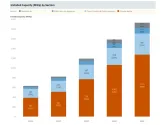How Banks Can Accelerate Financial Inclusion in Southeast Asia
By Emma ScalesThanks to the pandemic, the uncertainty of the world economy has been especially devastating for those living on the poverty threshold and struggling to make ends meet. Many in this demographic lost much-needed jobs as the economy shrunk, while others hustled on the side, for example, as food sellers, to continue to put bread on the table.
In Thailand, the poverty rate increased from 6.2% to 8.8% in 2020, while Indonesia saw an uptick from 9.78% to 10.19%, according to the World Bank.
Ethnographic research by Publicis Sapient shows that there’s much more to understand about uplifting the livelihoods of those living at subsistence level in Southeast Asia, especially as financial inclusion efforts seek to serve the unbanked and underbanked in this region.
In a qualitative study of respondents in Indonesia and Thailand in 2021, Publicis Sapient found that their financial needs greatly varied as they moved through various stages in life. Upon finishing school, people enter the workforce and begin growing their income. Key life events like marriage and children soon enter the picture. This is where a number of families fall into the trough as new family members increase monthly household expenditure and cultural norms dictate the number of income streams a family can rely on. Some people in this situation begin exploring pathways like small business ownership to improve their family’s economic situation.
For many in this demography, financial stability comes in waves across their journey – savings rise when income flow is secure and stable. While at first the unbanked and underbanked may not seem to be viable customers for banks, a deeper understanding of their financial needs and practices reveals behaviors that are like that of standard bank customers. They spend, they save, and they borrow.
The ability to meet diverse financial needs at various life stages is key to the success of financial institutions in Southeast Asia, a booming region that expects $4.7 trillion in Gross Domestic Product (GDP) by 2025 and where 70% of the adult population is still unbanked or underbanked.
How financial institutions serve this customer segment deserves more consideration. Banks, for example, must match their solutions to the specific needs of customers instead of delivering solutions that are one-size-for-all. Just as important is making use of digital innovations, such as mobile technologies, to serve more customers at scale.
An example, in the Philippines, CIMB uses its OCTO app to enable customers to open accounts seamlessly in 10 minutes, without initial deposit or maintaining balance requirements. In Thailand and Indonesia, TMRW uses a video call to verify a customer’s identity in its account opening drive for millennials. Customer queries are handled by TMRW's 24-hour chatbot that converses in Bahasa Indonesia.
How a bank develops its solutions for the unbanked and underbanked depends on how best to match the very different needs of this customer segment. To better understand this, the Publicis Sapient study sought to rethink financial inclusion through the perspective of a life journey and make a difference to serving the underserved.
Understanding the various archetypes throughout these journeys helps banks to better understand their pain points and cater to their needs. The study identifies the following six archetypes, each with varying needs:
• New kids on the block - Someone who is just starting a first full-time job and living alone. Income and savings, if any, are often in cash. In times of need, loans are typically only available from employers for emergencies. Here, financial literacy needs to be built from the ground up.
• Independents - For individuals who have already entered the workforce but still rely on cash for daily wages and spending. Loans may come from informal community-based savings groups. Financial literacy is key though individuals in this group may already have a bank account through an employer.
• Hopeful newlyweds - For hopeful newlyweds, typically employed full-time for a few years, the situation is more stable. The instinct here is to save a part of the salary received from employers.
• Struggling family - As a couple starts having kids, they often find themselves fitting the “struggling families” archetype. Here, they often depend on out-of-system loans such as from friends or neighbors.
• Future-ready parents - Moving up the ladder, more stable income earners are ready to invest in business opportunities. With a more reliable income, they also want more independence and security via a bank account.
• Micro-entrepreneurs - Finally, individuals or families who run their own income stream, or micro-entrepreneurs may have already placed their savings in a bank, and they might have made purchases, say, a motorcycle with credit from the bank.
In the path to understanding the unbanked and underbanked population in the region, the ability to map the different archetypes and their changing needs as they transition through life will be a challenge for financial institutions.
Yes, reaching more customers is easier than ever – a phone, an app and a digital wallet can now connect thousands of customers without the bank having to open a branch in a remote area. There is no need to worry about physical infrastructure when the digital equivalent is much more scalable.
That said, a bank’s relationship with a customer should be more than about enabling transactions. Knowing what a customer needs at a particular point in life allows banks to create experiences that matter. The financial products that an unbanked or underbanked customer wants at the start of their working life is very different to what they require at later stages in life. For a bank or lender to provide the financial tools and resources to empower these consumers as they too are uplifted in the future economic growth of Southeast Asia, a more bespoke approach is needed.
***
About Emma Scales
Emma Scales is Managing Director for Publicis Sapient in ASEAN. She is a member of the Publicis Sapient Global Leadership Team and her role is to drive growth in ASEAN.
Based in Sydney, Australia, Emma has been with Publicis Sapient since 2007, and brings with her over two decades of experience across three continents leading teams, driving growth and delivering transformative change for clients, teams and businesses.
With her people-oriented expertise and growth mindset, Emma has led global, regional, and country-level change initiatives that affect 10,000’s of people. She has also partnered with executives across markets and industries to pivot their APAC businesses towards a global strategy, or to navigate through disruptive transformation in their local context.
Emma is passionate about financial inclusion and the role governments, financial institutions, and consultancies can play in supporting a brighter financial future for the people in ASEAN.
Prior to her current role as Managing Director, ASEAN, Emma was the People Strategy Lead for Asia Pacific where she worked with the leadership team to define a strategy that truly reflected the organisation’s ambition. She was also previously the Global Lead for Talent and Learning for SapientNitro while based in London, United Kingdom.




















 Advertise
Advertise











